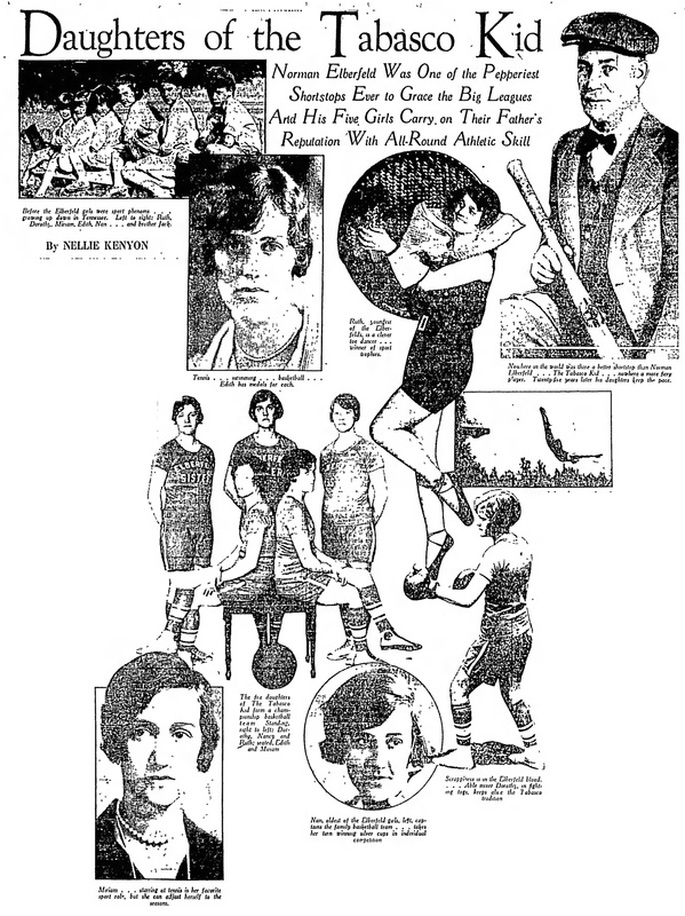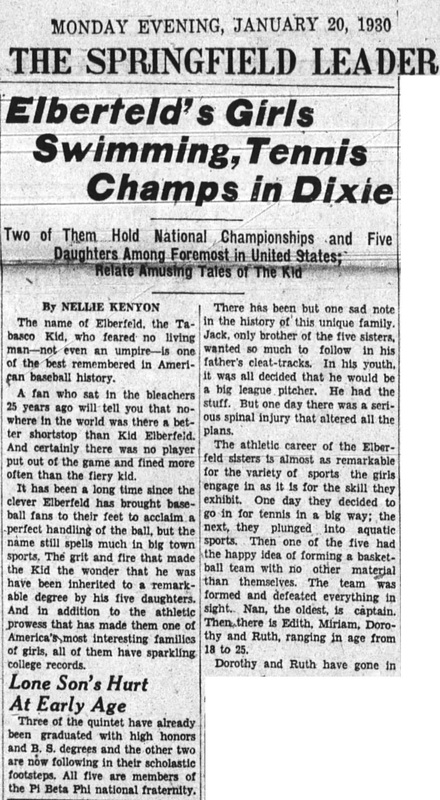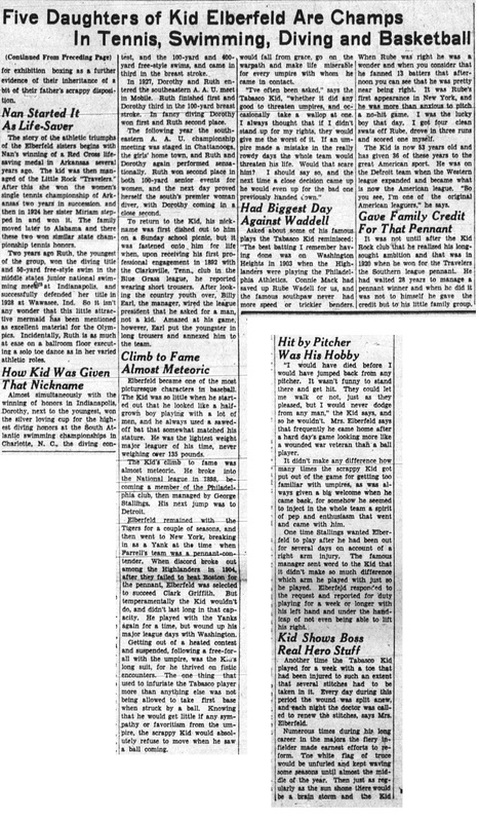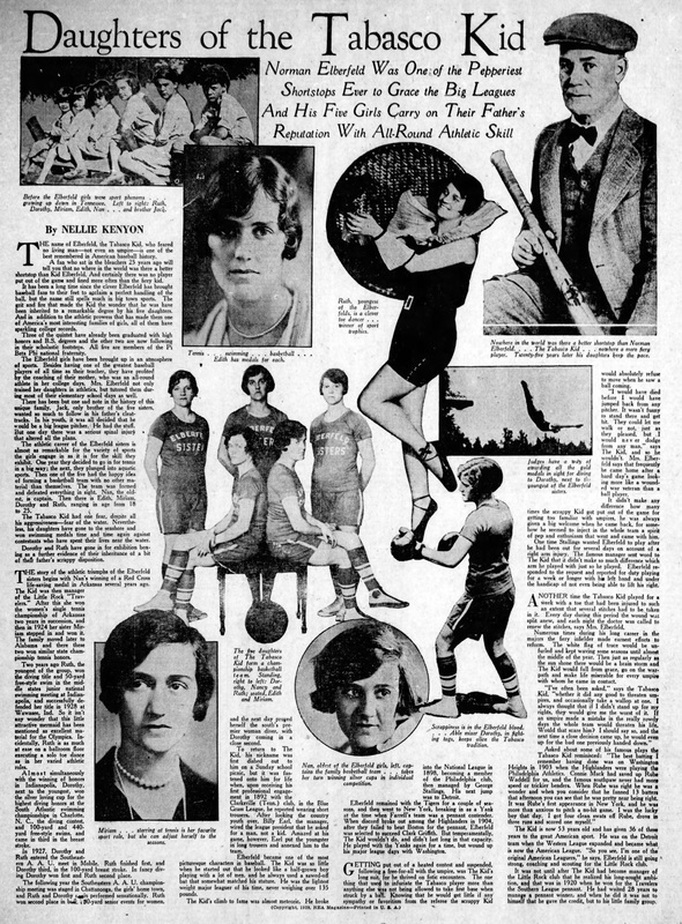January 20, 1930 - Springfield Leader, MO - Elberfeld's Girls Swimming, Diving Champs
This article appeared in many newspaper in late 1929 and early 1930.
MONDAY EVENING, JANUARY 20, 1930
THE SPRINGFIELD LEADER (Missouri)
Elberfeld Girls Swimming,Tennis Champs in Dixie
Two of Them Hold National Championships and Five Daughters Among FOremot in United States; Relate Amusing Tales of The Kid
By NELLIE KENYON
The name of Elberfeld, the Tabasco Kid, who feared no living man—not even an umpire—is one of the best remembered in American baseball history.
A fan who sat in the bleachers 25 years ago will tell you that nowhere in the world was there a better shortstop than Kid Elberfeld. And certainly there was no player put out of the game and fined more often than the fiery kid.
It has been a long time since the clever Elberfeld has brought baseball fans to their feet to acclaim a perfect handling of the ball, but the name still spells much in big town sports. The grit and fire that made the Kid the wonder that he was have been inherited to a remarkable degree by his five daughters. And in addition to the athletic prowess that has made them one of America's most interesting families of girls, all of them have sparkling college records.
Lone Son's Hurt At Early Age
Three of the quintet have already been graduated with high honors and B. S. degrees and the other two are now following in their scholastic footsteps. All five are members of the Pi Beta Phi national fraternity.
There has been but one sad note in the history of this unique family. Jack, only brother of the five sisters, wanted so much to follow in his father's cleat-tracks. In his youth, it was all decided that he would be a big league pitcher. He had the stuff. But one day there was a serious spinal injury that altered all the plans.
The athletic career of the Elberfeld sisters is almost as remarkable for the variety of sports the girls engage in as it is for the skill they exhibit. One day they decided to go in for tennis in a big way; the next, they plunged into aquatic sports. Then one of the five had the happy idea of forming a basket ball team with no other material than themselves. The team was formed and defeated everything in sight. Nan, the oldest, is captain. Then there is Edith, Miriam, Dorothy and Ruth, ranging in age from 18 to 25.
Five Daughters of Kid Elberfeld Are Champs in Tennis, Swimming, Diving and Basketball
Dorothy and Ruth have gone in for exhibition boxing as a further evidence of their inheritance of a bit of their father's scrappy disposition.
Nan Started It As Life-Saver
The story of the athletic triumphs of the Elberfeld sisters begins with Nan's winning of a Red Cross lifesaving medal in Arkansas several years ago. The kid was then managed of the Little Rock "Travelers." After this she won the women's single tennis championship of Arkansas two years in succession and then in 1924 her sister Miriam stepped in and won it. The family moved later to Alabama and there these two won similar state championship tennis honors.
Two years ago Ruth, the youngest of the group, won the diving title and 50-yard free-style swim in the middle states junior national swimming meet at Indianapolis, and successfully defended her title in 1928 at Wawasee, Ind. So it isn't any wonder that this little attractrive mermaid has been mentioned as excellent material for the Olympics. Incidentally, Ruth is as much at ease on a ballroom floor executing a solo the dance as in her varied athletic roles.
How Kid Was Given That Nickname
Almost simultaneously with the winning of honors in Indianapolis, Dorothy, next to the youngest, won the silver loving cup for the highest diving honors at the South Atlantic swimming championships in Charlotte, N. C., the diving contest, and the 100-yard and 400-yard free-style swims, and came in third in the breast stroke.
In 1927, Dorothy and Ruth entered the southeastern A. A. U. meet In Mobile. Ruth finished first and Dorothy third in the 100-yard breast stroke. In fancy diving Dorothy won first and Ruth second place.
The following year the south-eastern A. A. U. championship meeting was staged In Chattanooga. the girls' home town, and Ruth and Dorothy again performed sensationally. Ruth won second place in both 100-yard senior events for women, and the next day proved herself the south's premier woman diver, with Dorothy coming in a close second.
To return to the Kid, his nickname was first dished out to him on a Sunday school picnic, but it was fastened onto him for life when. upon receiving his first professional engagement in 1892 with the Clarksville, Tenn., club in the Blue Grass league, he reported wearing short trousers. After looking the country youth over, Billy Earl, the manager, wired the league president that he asked for a man, not a kid. Amazed at his game, however, Earl put the youngster in long trousers and annexed him to the team.
Climb to Fame Almost Meteoric
Elberfeld became one of the most picturesque characters in baseball. The Kid was so little when he started out that he looked like a half-grown boy playing with a lot of men, and he always used a sawed-off bat that somewhat matched his stature. He was the lightest weight major leaguer of his time, never weighing over 135 pounds.
The Kid's climb to fame was almost meteoric. He broke into the National league in 1898 becoming a member of The Philadelphia club, then managed by George Stallings. His next jump was to Detroit.
Elberfeld remained with the Tigers for a couple of seasons, and then went to New York, breaking in as a Yank at the time when Farrell's team was a pennant-contender. When discord broke out among the Highlanders in 1904, after they failed to beat Boston for the pennant, Elberfeld was selected to succeed Clark Griffith. But temperamentally the Kid wouldn't do, and didn't last long in that capacity. He played with the Yanks again for a time, but wound up his major league days with Washington.
Getting out of a heated contest and suspended, following a free-for-all with the umpire, was the Kidis long suit, for he thrived on fistic encounters. The one thing that used to infuriate the Tabasco player more than anything else was not being allowed to take first base when struck by a ball. Knowing that he would get little if any sympathy or favoritism from the umpire, the scrappy Kid would absolutely refuse to move when he saw a ball coming.
Hit by Pitcher Was His Hobby
"I would have died before I would have jumped back from any pitcher. It wasn't funny to stand there and get hit. They could let me walk or not, just as they pleased, but I would never dodge from any man," the Kid says, and so he wouldn't. Mrs. Elberfeld says that frequently he came home after a hard day's game looking more like a wounded war veteran than a ball player.
It didn't make any difference how many times the scrappy Kid got put out of the game for getting too familiar with umpires, and was always given a big welcome when he came back, for somehow he seemed to inject in the whole team a spirit of pep and enthusiasm that went and came with him.
One time Stallings wanted Elberfeld to play after he had been out for several days on account of a right arm injury. The famous manager sent word to the Kid that it didn't make so much difference which arm he played with just so
he played. Elberfeld responded to the request and reported for duty playing for a week or longer with his left hand and under the handicap of not even being able to lift his right.
Kid Shows Boss Real Hero Stuff
Another time the Tabasco Kid played for a week with a toe that had been injured to such an extent that several stitches had to be taken in It Every day during this period the wound was split anew, and each night the doctor was called to renew the stitches, says Mrs. Elberfeld.
Numerous times during his long career in the majors the fiery infielder made earnest efforts to reform. The white flag of truce would be unfurled and kept waving some seasons until almost the middle of the year. Then just as regularly as the sun shone there would be a brain storm and the Kid would fall from grace, go on the warpath and make life miserable for every umpire with whom he came in contact.
"I've often been asked," says the Tabasco Kid, "whether It did any good to threaten umpires, and occasionally take a wallop at one. I always thought that if I didn't stand up for my rights, they would give me the worst of it. If an umpire made a mistake in the really rowdy days the whole team would threaten his life. Would that scare him? I should say so, and the next time a close decision came up he would even up for the bad one previously handed down."
Had Biggest Day Against Waddell
Asked about some of his famous plays the Tabasco Kid reminisced: "The best batting I remember having done was on Washington Heights in 1903 when the Highlanders were playing the Philadelphia Athletics. Connie Mack had saved up Rube Wadell for us, and the famous southpaw never had more speed or trickier benders.
When Rube was right he was a wonder and when you consider that he fanned 13 batters that afternoon you can see that he was pretty near being right. It was Rube's first appearance in New York, and he was more than anxious to pitch a no-hit game. I was the lucky boy that day. I got four clean swats off Rube, drove in three runs and scored one myself.
The Kid is now 53 years old and has given 36 of them years to the great American sport. He was on the Detroit team when the Western league expanded and became what is now the American league. "So you see, I'm one of the original American leaguers," he says.
Gave Family Credit For That Pennant
It was not until after the Kid Rock club that he realized his long-sought ambition and that was in 1920 when he won for the Travelers the Southern league pennant. He had waited 28 years to manage a pennant winner and when hr did it was not to himself he gave the credit but to his little family group.
THE SPRINGFIELD LEADER (Missouri)
Elberfeld Girls Swimming,Tennis Champs in Dixie
Two of Them Hold National Championships and Five Daughters Among FOremot in United States; Relate Amusing Tales of The Kid
By NELLIE KENYON
The name of Elberfeld, the Tabasco Kid, who feared no living man—not even an umpire—is one of the best remembered in American baseball history.
A fan who sat in the bleachers 25 years ago will tell you that nowhere in the world was there a better shortstop than Kid Elberfeld. And certainly there was no player put out of the game and fined more often than the fiery kid.
It has been a long time since the clever Elberfeld has brought baseball fans to their feet to acclaim a perfect handling of the ball, but the name still spells much in big town sports. The grit and fire that made the Kid the wonder that he was have been inherited to a remarkable degree by his five daughters. And in addition to the athletic prowess that has made them one of America's most interesting families of girls, all of them have sparkling college records.
Lone Son's Hurt At Early Age
Three of the quintet have already been graduated with high honors and B. S. degrees and the other two are now following in their scholastic footsteps. All five are members of the Pi Beta Phi national fraternity.
There has been but one sad note in the history of this unique family. Jack, only brother of the five sisters, wanted so much to follow in his father's cleat-tracks. In his youth, it was all decided that he would be a big league pitcher. He had the stuff. But one day there was a serious spinal injury that altered all the plans.
The athletic career of the Elberfeld sisters is almost as remarkable for the variety of sports the girls engage in as it is for the skill they exhibit. One day they decided to go in for tennis in a big way; the next, they plunged into aquatic sports. Then one of the five had the happy idea of forming a basket ball team with no other material than themselves. The team was formed and defeated everything in sight. Nan, the oldest, is captain. Then there is Edith, Miriam, Dorothy and Ruth, ranging in age from 18 to 25.
Five Daughters of Kid Elberfeld Are Champs in Tennis, Swimming, Diving and Basketball
Dorothy and Ruth have gone in for exhibition boxing as a further evidence of their inheritance of a bit of their father's scrappy disposition.
Nan Started It As Life-Saver
The story of the athletic triumphs of the Elberfeld sisters begins with Nan's winning of a Red Cross lifesaving medal in Arkansas several years ago. The kid was then managed of the Little Rock "Travelers." After this she won the women's single tennis championship of Arkansas two years in succession and then in 1924 her sister Miriam stepped in and won it. The family moved later to Alabama and there these two won similar state championship tennis honors.
Two years ago Ruth, the youngest of the group, won the diving title and 50-yard free-style swim in the middle states junior national swimming meet at Indianapolis, and successfully defended her title in 1928 at Wawasee, Ind. So it isn't any wonder that this little attractrive mermaid has been mentioned as excellent material for the Olympics. Incidentally, Ruth is as much at ease on a ballroom floor executing a solo the dance as in her varied athletic roles.
How Kid Was Given That Nickname
Almost simultaneously with the winning of honors in Indianapolis, Dorothy, next to the youngest, won the silver loving cup for the highest diving honors at the South Atlantic swimming championships in Charlotte, N. C., the diving contest, and the 100-yard and 400-yard free-style swims, and came in third in the breast stroke.
In 1927, Dorothy and Ruth entered the southeastern A. A. U. meet In Mobile. Ruth finished first and Dorothy third in the 100-yard breast stroke. In fancy diving Dorothy won first and Ruth second place.
The following year the south-eastern A. A. U. championship meeting was staged In Chattanooga. the girls' home town, and Ruth and Dorothy again performed sensationally. Ruth won second place in both 100-yard senior events for women, and the next day proved herself the south's premier woman diver, with Dorothy coming in a close second.
To return to the Kid, his nickname was first dished out to him on a Sunday school picnic, but it was fastened onto him for life when. upon receiving his first professional engagement in 1892 with the Clarksville, Tenn., club in the Blue Grass league, he reported wearing short trousers. After looking the country youth over, Billy Earl, the manager, wired the league president that he asked for a man, not a kid. Amazed at his game, however, Earl put the youngster in long trousers and annexed him to the team.
Climb to Fame Almost Meteoric
Elberfeld became one of the most picturesque characters in baseball. The Kid was so little when he started out that he looked like a half-grown boy playing with a lot of men, and he always used a sawed-off bat that somewhat matched his stature. He was the lightest weight major leaguer of his time, never weighing over 135 pounds.
The Kid's climb to fame was almost meteoric. He broke into the National league in 1898 becoming a member of The Philadelphia club, then managed by George Stallings. His next jump was to Detroit.
Elberfeld remained with the Tigers for a couple of seasons, and then went to New York, breaking in as a Yank at the time when Farrell's team was a pennant-contender. When discord broke out among the Highlanders in 1904, after they failed to beat Boston for the pennant, Elberfeld was selected to succeed Clark Griffith. But temperamentally the Kid wouldn't do, and didn't last long in that capacity. He played with the Yanks again for a time, but wound up his major league days with Washington.
Getting out of a heated contest and suspended, following a free-for-all with the umpire, was the Kidis long suit, for he thrived on fistic encounters. The one thing that used to infuriate the Tabasco player more than anything else was not being allowed to take first base when struck by a ball. Knowing that he would get little if any sympathy or favoritism from the umpire, the scrappy Kid would absolutely refuse to move when he saw a ball coming.
Hit by Pitcher Was His Hobby
"I would have died before I would have jumped back from any pitcher. It wasn't funny to stand there and get hit. They could let me walk or not, just as they pleased, but I would never dodge from any man," the Kid says, and so he wouldn't. Mrs. Elberfeld says that frequently he came home after a hard day's game looking more like a wounded war veteran than a ball player.
It didn't make any difference how many times the scrappy Kid got put out of the game for getting too familiar with umpires, and was always given a big welcome when he came back, for somehow he seemed to inject in the whole team a spirit of pep and enthusiasm that went and came with him.
One time Stallings wanted Elberfeld to play after he had been out for several days on account of a right arm injury. The famous manager sent word to the Kid that it didn't make so much difference which arm he played with just so
he played. Elberfeld responded to the request and reported for duty playing for a week or longer with his left hand and under the handicap of not even being able to lift his right.
Kid Shows Boss Real Hero Stuff
Another time the Tabasco Kid played for a week with a toe that had been injured to such an extent that several stitches had to be taken in It Every day during this period the wound was split anew, and each night the doctor was called to renew the stitches, says Mrs. Elberfeld.
Numerous times during his long career in the majors the fiery infielder made earnest efforts to reform. The white flag of truce would be unfurled and kept waving some seasons until almost the middle of the year. Then just as regularly as the sun shone there would be a brain storm and the Kid would fall from grace, go on the warpath and make life miserable for every umpire with whom he came in contact.
"I've often been asked," says the Tabasco Kid, "whether It did any good to threaten umpires, and occasionally take a wallop at one. I always thought that if I didn't stand up for my rights, they would give me the worst of it. If an umpire made a mistake in the really rowdy days the whole team would threaten his life. Would that scare him? I should say so, and the next time a close decision came up he would even up for the bad one previously handed down."
Had Biggest Day Against Waddell
Asked about some of his famous plays the Tabasco Kid reminisced: "The best batting I remember having done was on Washington Heights in 1903 when the Highlanders were playing the Philadelphia Athletics. Connie Mack had saved up Rube Wadell for us, and the famous southpaw never had more speed or trickier benders.
When Rube was right he was a wonder and when you consider that he fanned 13 batters that afternoon you can see that he was pretty near being right. It was Rube's first appearance in New York, and he was more than anxious to pitch a no-hit game. I was the lucky boy that day. I got four clean swats off Rube, drove in three runs and scored one myself.
The Kid is now 53 years old and has given 36 of them years to the great American sport. He was on the Detroit team when the Western league expanded and became what is now the American league. "So you see, I'm one of the original American leaguers," he says.
Gave Family Credit For That Pennant
It was not until after the Kid Rock club that he realized his long-sought ambition and that was in 1920 when he won for the Travelers the Southern league pennant. He had waited 28 years to manage a pennant winner and when hr did it was not to himself he gave the credit but to his little family group.
Same article but better photographs.







